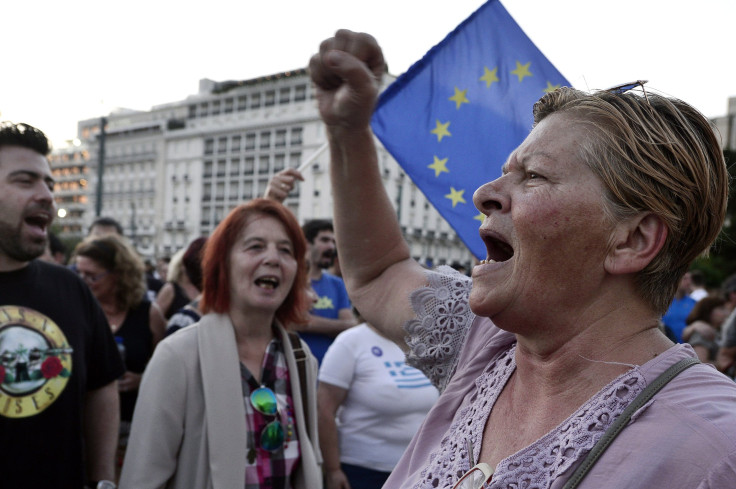Greece Debt Crisis Update: A Guide To 'Germanotsolias,' The Slang Term Being Used for Pro-Europe Greeks

The term "Germanotsolias" has been springing up in debates in Greece over what a bailout should look like and whether Greece should remain in the eurozone. The word, a slang term that was used for Greeks who collaborated with Germany during World War II, has been seen all over Facebook, and the hashtag Germanotsolias saw a spike in numbers in the past week.
"Germanotsolias" is not a term to be taken lightly, according to interviews with Greeks published on the website of Cincinnati radio station WVXU. The word means "something like a traitor — that you want to promote the German interests and not the Greek ones," said Konstantinos Koutsantonis, a 22-year-old Greek student.
Koutsantonis told WVXU that he was called a "Germanotsolias" by an acquaintance when he posted a pro-European Union status on Facebook about how he voted "yes" in Greece's referendum on a debt bailout plan on Sunday. The referendum asked Greek citizens whether they wanted to accept terms for a bailout from European creditors that would require further austerity measures in Greece, including budget cuts.
Roughly 61 percent of Greeks voted "no" in the referendum, as urged by Prime Minister Alexis Tsipras. Tsipras and his Syriza-led left-wing government urged a "no" vote in hopes that it would give Greece better negotiating power with is creditors.
Through resurgent use of "Germanotsolias," "yes" voters like Koustsantonis have had to re-evaluate what it means to be pro-Europe in today's tumultuous atmosphere in Greece. The use of Nazi or collaborationist slang in Greece has cropped up as an angry response toward Germany and Chancellor Angela Merkel. Germany is one of the largest creditors in the EU and Merkel helped design many of the bailout plans that included harsh austerity measures for Greece.
Eurozone officials said Friday that Greece had submitted "thorough" proposals aimed at averting a possible exit from the euro. Eurogroup President Jeroen Dijsselbloem said the eurozone would discuss a plan on Saturday, BBC reported.
© Copyright IBTimes 2025. All rights reserved.






















